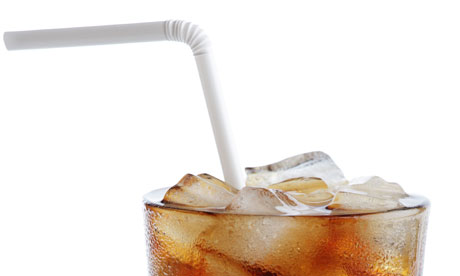
The problem
On a hot day do you reach for a cool can of Coke or a glass of water, and does it matter? Obesity (the body doesn't seem to regulate its appetite in response to calories in drinks so the sugary drinks are extra calories), dental caries and an increase in diabetes are uncontested risks of drinking sugary fizzy drinks. Fatty livers and pancreatic cancer have also more recently been linked to a hefty intake of sugary, fizzy drinks (up to four cans a day) by researchers, but the studies are not conclusive.
Those of us watching our weight, meanwhile, may have switched to diet drinks, which contain artificial sweeteners, some many hundreds of times sweeter than natural sugars, but without the calories. Coca-Cola's website says Diet Coke, Coke Zero and Lilt Zero contain aspartame and acesulfame-K. Slimline drinks such as Schweppes slimline Canada Dry ginger ale contain a blend of aspartame and saccharin.
The dilemma
Aspartame has been dogged by controversy ever since it was approved as a food additive over 35 years ago. A report in the Daily Mail last week said that the European Food Safety Authority (EFSA) is being asked to bring forward a safety review of it by members of the European parliament following a Danish study showing an increase in premature births in mothers drinking diet drinks and research showing cancer growth in mice who were fed aspartame.
The EFSA will report in 2012 instead of 2020 but has already said these recent studies have not made them change their opinion on aspartame's safety. Yet anti-aspartame activists have long claimed it causes brain tumours, multiple sclerosis, blindness, headaches, depression and birth defects. The cause, they say, may be that the body metabolises aspartame by breaking it down to toxic substances, namely methanol and then formaldehyde (which bodies are pickled in at medical school for dissection purposes) and formic acid. But the amounts of these metabolites are small. The US Food and Drug Administration (FDA) says you would need to drink 21 cans of diet sodas a day to approach the recommended safe limit for aspartame and its metabolites.
Aspartame has been cleared as safe in the US and Europe, but you may think there's no smoke without fire. Some supermarkets stopped using aspartame in their own branded diet products a decade ago. If there is even a whisper of a health scare about a drink you don't need shouldn't you opt for a healthier, cheaper alternative such as tap water?
The solution
Don't be scared by health scares, some of which are urban myths. We don't absorb aspartame and, as a letter to the Lancet said in 1999, almost all the adverse reports across many websites are anecdotal. The letter pointed about that while a 330ml can of diet coke would provide 20mg of methanol, the same amount of fruit juice would yield 40mg. The FDA said that aspartame was "one of the most thoroughly tested and studied food additives the agency has ever approved". The National Cancer Institute in the US says that there is no clear evidence that any of the artificial sweeteners commonly available are associated with an increased risk of cancers in humans.
But these drinks are not good for you. By drinking them you displace those with nutritional value such as milk (essential for healthy bones and teeth) and fruit juice. The UK Food Standards Agency has launched a pilot study to test individual sensitivity to aspartame. In the meantime you should avoid fizzy drinks with sugar because they have nothing to redeem them except their taste, and only drink diet ones on a limited basis.

